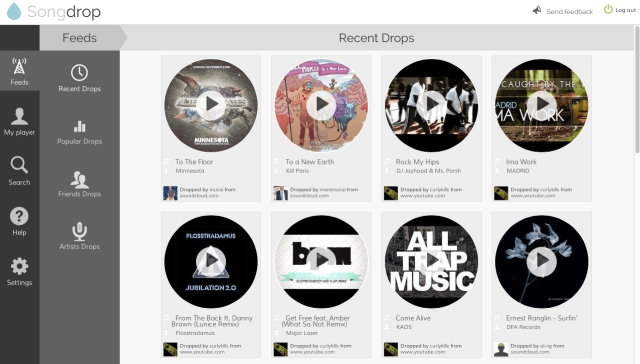With competitors such as Ex.fm and Whyd, it may not be the most original idea, but newly-launched Songdrop — which is perhaps best described as a ‘Delicious for music’ — is a fun and well designed take on solving the music discovery and sharing problem, at least for music fans that live outside of the paywalls of services such as Spotify.
Today the company is announcing its first round of funding. SOIC Capital, a seed and early-stage fund that largely focuses on social fashion and music startups, has invested £100,000 (~$150k) in the burgeoning London-based company.
Consisting of a web app-only for now but with mobile apps in the pipeline, Songdrop lets users ‘bookmark’, organise and share music from disparate sources such as YouTube, Soundcloud, Vevo, and various blogs. Users sign up via Facebook or directly, install the cross-browser bookmarklet or Chrome extension, and can then begin bookmarking — or dropping — music (and videos) they discover across the web for later retrieval.
Tracks can be organised into playlists and shared either within the service itself — re-dropped — or on Facebook and Twitter via the liberally sprinkled ‘Like’ and ‘Tweet’ buttons.
In a further nod to social, users can follow one another on Songdrop itself and/or import their Facebook friend-list. Artists can be “followed”, too, so that if others bookmark tracks by a certain band they’ll automatically show up in a user’s feed.

“We believe the API for music already exists: it’s the whole internet. Songdrop is a way to make sense of the chaos,” says Songdrop’s Brittney Bean in an apt statement that neatly sums up the company’s mission.
However, although it’s very early days for Songdrop, that mission feels like it still has some way to go and may never be fully realised due to no fault of the company. Missing in action is support for walled gardened or paywalled services like Spotify or Deezer, which already have their own bookmarking and sharing systems and whose business plans to some extent rely on a lack of interoporability and locking users in.
On the other hand, that may be half the point of something like Songdrop: there’s a wealth of music to be discovered outside of these uber-streaming services, we just need a better way to retrieve, organise and share it.
But with the service free to use, how does Songdrop plan to make money? I’m told that paid-for mobile apps is one option under development, and certainly an on-the-go listening experience is something that users might well pay for. In-app purchases for premium features, perhaps ‘offline’ playback (though I’m just speculating here), are planned, too. There’s also the possibility to generate affiliate revenue through any related music purchases.
In addition, the company says it’s looking to partner with brands and media companies who could use the service to help them “build an identity using music” and to “reach new audiences”, which sounds a little woolly at this stage.
Interestingly, however, along with Songdrop’s founders Brittney Bean, Richard Taylor and James Towers, the company has recently hired Chris Helm as Finance Director to help work up the business model. He was previously UK Finance Director with EMI Music Publishing, so I dare say there’s more to come on the monetization front.
Of course, Songdrop will need to achieve some decent traction first.
